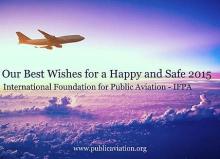
While the discussions on the consequences for civil aviation of the Flight MH17 disaster continue, several legal and institutional questions have already come to the fore. In particular, the management of sovereign airspace and the conglomerate of safety & security rules have been placed under the microscope. Sovereign functions such as closure of (parts of) national airspace or restrictions on its use, the role of ATC providers, and the management of (civil) air traffic will equally remain under scrutiny. Finally, the security aspects of safety management systems and performance based oversight have also entered the debate. ICAO has created a Task Force to provide advice on some of these issues and the High Level Safety Conference, scheduled in Montreal from 2‐5 February 2015, has now put the issue on its agenda as a priority item.
The International Foundation for Public Aviation (IFPA) is organizing a seminar, supported by the Dutch Ministry for Infrastructure & Environment and Schiphol Airport, which will bring together a number of invited legal, safety and aviation experts to discuss the responsibilities and liabilities that relate to civil aviation. Three broad topics seem to emanate from the tragic downing of MH17 over the Ukraine:
In debating these key elements, we foresee that a critical assessment of the present division of civil aviation functions at Global, European and National level is called for. Additionally, evaluating the role and views of the industry and key stakeholders working alongside regulators, is essential. By organising a representative forum we hope to contribute to free‐flowing and constructive debate on the legal and institutional issues at hand, and on possible ways forward. While all views and insights are welcome, we will avoid impinging on the difficult and delicate accident investigation processes and procedures that are currently in progress.
ATTENDEES, SPEAKERS AND MODERATORS
We have invited representatives from, among others, national CAAs and Air Navigation Service Providers, ICAO, EASA, EUROCONTROL, the European Commission, CANSO, the EESC, the European Parliament, IATA, AEA, ECA as well as leading academics and law firms in the field of aviation and international law.
Two panels of seasoned experts are foreseen. One panel will explore existing rules and regulations as well as applicable policies and practices that have or should have an impact on flying over (potential) conflict zones. This will include existing crisis control strategies, sovereign and supranational functions and associated insurance and liabilities. The other panel will discuss the possibilities of effective new legal and institutional options or improvements. Such a reality check would discuss, among others, scenarios that foresee public/ private cooperation at regional or global level and the associated responsibilities and liabilities. Both panels and all participants are expected to interact in plenary discussions on the questions and views presented through the good offices of two highly distinguished moderators. Two keynote speakers will provide and introduction for each panel session.
There is no attendance fee and the number of participants will be limited to ensure effective interaction. Emphasis will be on moderated panel discussions with maximum interaction of participants and a restricted number of introductory speakers. IFPA will provide participants with some pre‐seminar documentation and intends to distribute the records of the discussions and findings. The purpose of these papers will be to highlight aspects that might be of relevance for the follow up to the discussions on handling conflict zones in aviation and the implementation of effective remedies.
PRACTICAL INFORMATION
AGENDA
Note: Subject to change – final agenda with confirmed attendees will be communicated to participants as soon as possible
09:30 – 10:00 Registration and Coffee
10:00 – 12:30 Welcome by the Host Organizations Opening
Keynote Speaker
Panel Discussion 1: State of the art, the regulatory and policy impact of flying over conflict zones
Moderator
Panel members
12:30 ‐ 14:00 Lunch: Guest Speaker
14:00 – 14:30 Keynote Speaker
14:30 – 16:15 Panel Discussion 2: Legal, institutional and practical options: Are we ready for new scenarios; more or less privatization; at ICAO or Regional level
16:15 – 16:30 Break
16:30‐17:00 Wrap‐up and conclusions
17:00 Drinks